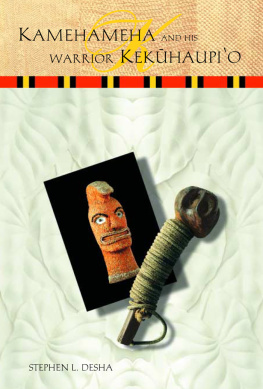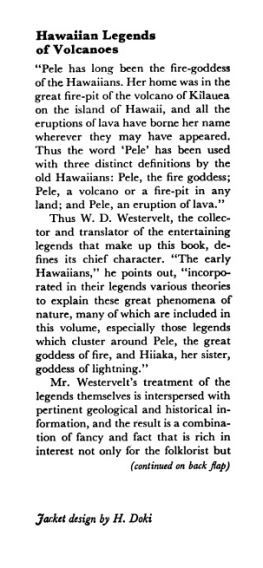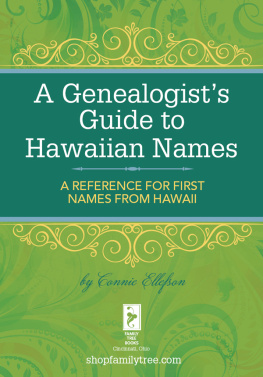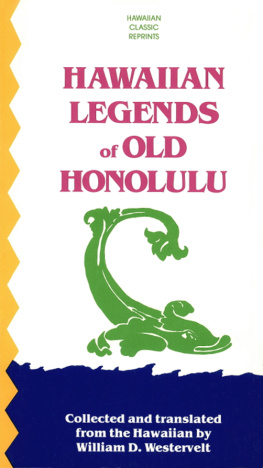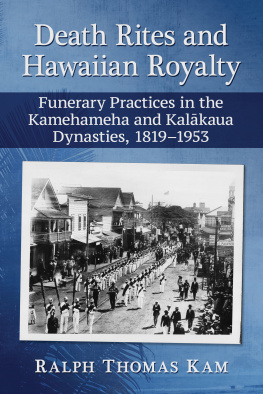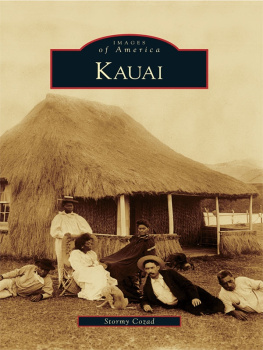KAMEHAMEHA AND HIS
WARRIOR KEKHAUPIO
On the cover:
Kkilimoku, Kamehamehas war god, and an koi, a warriors tripping club (both Bernice P. Bishop Museum Collections). The upper background design is a photograph of the inner fiber network of an actual feather cape. The lower background of stylized kalo leaves is a reminder that during times of peace Kamehameha also worshiped Kaholii, a god of the Makahiki.
Originally published in Ka Hoku o Hawaii
KAMEHAMEHA AND HIS
WARRIOR KEKHAUPIO
Written in Hawaiian by
Reverend Stephen L. Desha
Translated by
Frances N. Frazier
Produced with the assistance of
the State of Hawaii Historic
Preservation Division, DLNR
.......................................................
Kamehameha Schools Press
Honolulu 2000

Copyright 2000 by
Kamehameha Schools
All rights reserved. No part of this book may be reproduced in any form or by any electronic or mechanical means, including information storage and retrieval systems, without permission in writing from the publisher, except by a reviewer who may quote brief passages in a review.
Inquiries should be addressed to:
Kamehameha Publishing
567 South King Street, Suite 118
Honolulu, Hawaii 96813
www.kamehamehapublishing.org
ISBN 978-0-87336-302-0
Digital Edition
Book design by Viki Nasu
Cover design by Clarence Lee
Clarence Lee Design & Associates, Inc.
In fond remembrance of Mary Kawena Pukui who first inspired the translator to learn the Hawaiian language and whose example has so encouraged the preservation and restoration of the leloiwi.
nai wale n oukou e n alii, i kuu pono au i nai ai aole loa e pau.

Endless is the good I have conquered for you.
The last words uttered
by Kamehameha,
May 8, 1819,
Kamakahonu, Kona
CONTENTS
INTRODUCTION
O ka mea e pau ai ka waiwai o keia hana i waena o na Hawaii ma ke ano he kahu no lakou, o kou kokua aku i keia mau hana,
a hoao ole e pale aku i keia mau hana kupono ole.
A ina no ua ike au e waiwai ole kou noho kahu ana no lakou.
Ua makaukau no wau e waiho aku i kou noho ana i kahu no lakou.
Therefore, this would end the value of my calling as a minister among the Hawaiian people.
My assistance is needed in this matter to ward off this wrongful action.
And if not, I feel my job as minister to them is useless.
I would then be prepared to resign my position as minister to them.

So wrote Stephen Langhern Desha Sr., pastor of Haili Church on the island of Hawaii, to Reverend W.B. Olson in 1912. He was answering church instructions that he cease responding to negative comments about Hawaiians.
In large part, the recording of the traditions told here was motivated by Deshas proud advocacy of the Hawaiian people. Desha, newspaper editor and territorial senator from Hilo as well as pastor, saw this serial as a way to inform younger generations of Hawaiians of their culture and their past.
He wrote not only of the exploits of two famous warriors but also of the traditions and values which guided them and other Hawaiians in earlier times. Desha hoped, through sharing his knowledge of his ancestors and their ways, to instill within his Hawaiian readers a greater sense of pride in themselves. Today his message continues to inspire.
The following account first appeared as a serial in the Hawaiian-language weekly newspaper Ka Hoku o Hawaii (The Star of Hawaii). One hundred seventy-four articles were published between December 16, 1920, and September 11, 1924.
The first article, dated December 16, 1920, was entitled A Tale of Kekhaupio, the Famous Warrior of the Era of Kamehameha the Great (Written for the readers of Ka Hoku o Hawaii). The serial initially focuses on the story of Kekhaupio, an exceptionally strong and skillful Hawaiian warrior from Keei, South Kona. As with most noted warriors, he was a master in the ways of battle strategy and in understanding human nature in his enemies and allies alike. Kekhaupio advocated the importance of continued training to be always prepared for battle. He believed in heeding the omens of the gods of ancient Hawaiispirits from whom victory or defeat was thought to spring. Kekhaupio was well versed in the many disciplines of Hawaiian warfare, particularly that of lua (a bone-breaking form of wrestling), and a master in the use of weaponry.
Kekhaupio helped train the young high-ranking chief Kamehameha in these arts and then frequently fought at his side in Kamehamehas campaign to unite the island chain. He served his beloved chief as a stalwart bodyguard, fearless warrior, and trusted advisor. Kekhaupio was also closely associated with the khuna (priestly) class through his marriage to Pine, the daughter of Holoae, one of the most important spiritual advisors to the paramount chiefs of Hawaii Island.
Desha uses the character of Kekhaupio primarily as a device to retell the story of Kamehameha, a high-ranking chief of Hawaii Island who was probably born in the 1750s. Before his death in 1819 Kamehameha had become the first to unite the entire Hawaiian archipelago under one rule.
Readers familiar with the published traditions of Kamehameha, particularly those recorded by Kamakau and Fornander, will recognize most of the major events recounted and much of the lore surrounding these events and the participating characters. The serial initially traces Kamehamehas life from his birth in Kohala through his youth in the courts of the paramount chiefs Alapainui and Kalanipuu, his predecessors, and his rise to contender for the rule of Hawaii Island.
Following the recording of his success at the great battle of Mokuhai, Kona, the story revolves around Kamehamehas numerous political dealings and battles with the various other competing factions on Hawaii Island. His efforts at conquest were contested by the chiefs Keawemauhili, of Hilo, and Keua, of Ka, on Hawaii Island and later by Kahekili and Kalanikpule who controlled, respectively, the islands of Maui and Oahu. The account of Kamehamehas conquests given here is complete with several variant traditions concerning chief Kaumualiis peaceful yielding of Kauai to Kamehameha.
After detailing Kamehamehas conquests the story turns to his efforts to maintain peace and encourage prosperity in his new nation. Throughout the story Desha notes Kekhaupios roles as a faithful servant, an exceptional warrior, and an astute advisor.
Desha built on the works of previous writers for the content and organization of his narrative. By the 1920s a substantial body of written recordings of the oral traditions from the period of Kamehameha was available. Sources acknowledged by Desha include oral histories recorded by native Hawaiian scholars in Hawaiian (e.g., Samuel M. Kamakau, David Malo, and S.L. Peleioholani) and by resident foreigners interested in collecting and summarizing these traditions (e.g., Reverend John Pogue, James Jarves, Reverend Sheldon Dibble, Abraham Fornander, and William Alexander). Desha also incorporates the published accounts of foreign explorers who witnessed events recounted in the oral histories (e.g., Captains Cook, King, Vancouver, Dixon, and Portlock).
Deshas most significant source, however, was a newspaper serial about Kamehamehas life written by Joseph M. Poepoe. This serial had appeared in the Hawaiian-language newspaper
Next page
